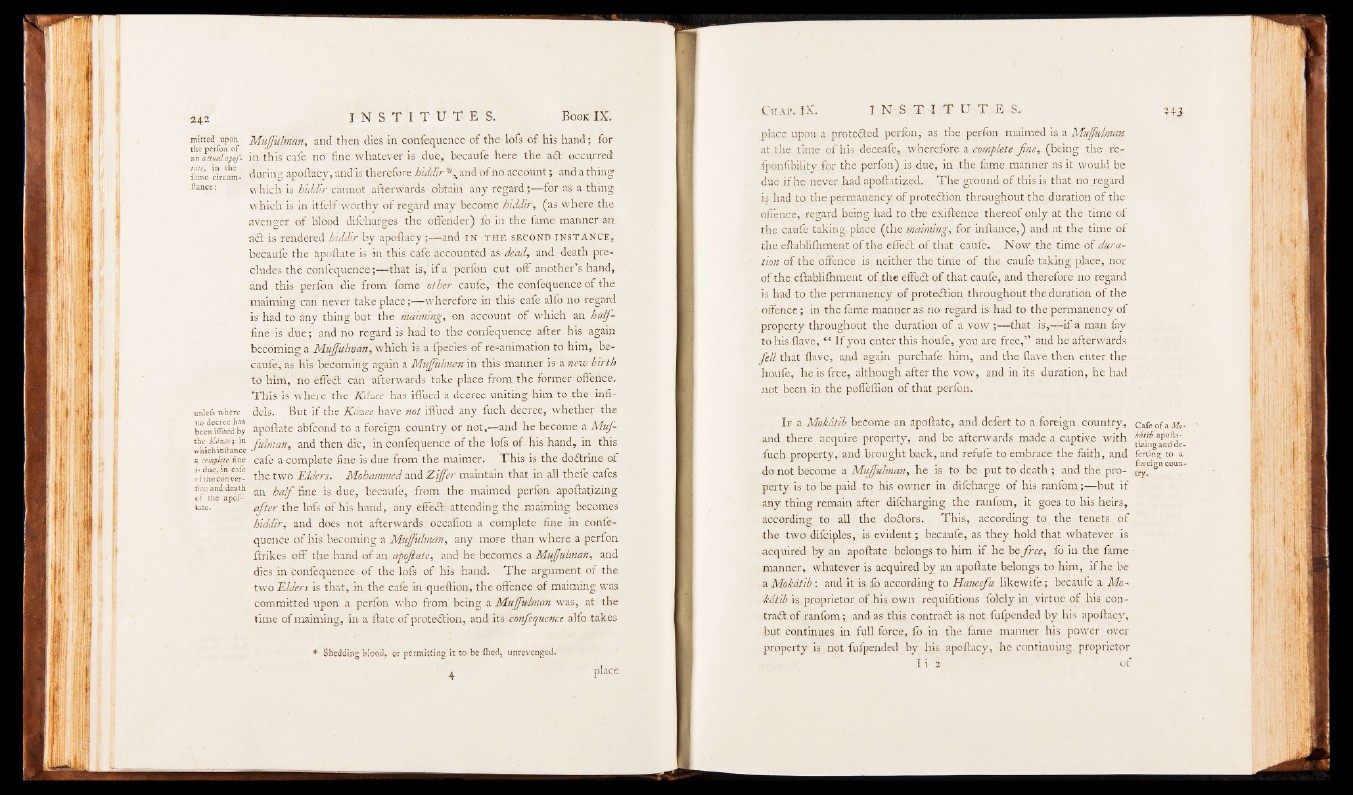
niitted upon
the perfon of
an aflual apof-
/ate, in the
fame circum-
irance :
unlefs where
no decree has
been ifined by
the Kazee$ in
which in fiance
a complete fine
is due, in cafe
of the converts
on and death
of the apof-
Mujfulman, and then dies in confequence of the lofs of his hand; for
in this cafe no fine whatever is due, becaufe here the aft occurred
during apoftacy, and is therefore hiddir \ a n d o f no adcount; and a thing
which is hiddir cannot afterwards obtain any regard;— for as a thing
which is in itfelf worthy of regard may become hiddir, (as where the
avenger of blood difcharges the offender) fo in the fame manner an
aft is rendered hiddtr by apoftacy;— and in the second in s t a n c e ,
becaufe the apoftate is in this cafe accounted as dead, and death precludes
the confequence;— that is, if a perfon cut off another’s hand,
and this perfon die from fome other caufe, the confequence of the
maiming can never take place;— wherefore in this cafe alfo no regard
is had to any thing but the maiming, on account of which an half-
fine is due; and no regard is had to the confequence after his again
becoming a Mujfulman, which is a fpecies of re-animation to him, becaufe,
as his becoming again a Mujfulman in this manner is a new birth
to him, no effeft can afterwards take place from the former offence.
This is where the Kdzee has iffued a decree uniting him to the infidels.
But if the Kdzee have not ifl'ued any fuch decree, whether the
apoftate abfcond to a foreign country or not,—and he become a Muf-
fulman, and then die, in confequence of the lofs of his hand, in this
cafe a complete fine is due from the maimer. This is the doftrine of
the two Elders. Mohammed and Zijfer maintain that in all thefe cafes
an half fine is due, becaufe, from the maimed perfon apoftatizing
after the lofs of his.hand, any effeft attending the maiming becomes
hiddir,■ and does not afterwards occa’fion a complete fine in confequence
of his becoming a Mujfulman, any more than where a perfon1
ftrikes off the hand of an apojlate, and he becomes a Mujfulman, and
dies in confequence of the lofs of his hand. The argument of the
two Elders is that, in the cafe in queftion, the offence of maiming was
committed upon a perfon who from being a Mujfulman was, at the
time of maiming, in. a ftate of proteftion, and its confequence alfo takes
* Shedding blo od , or pe rmittin g i t to be flied , unrev enged.
4 place
place upon a protefted perfon, as the perfon maimed is a Mujfulman
at the time of his deceafe, ..wherefore a complete fine, (being the re-
fponfibility for the perfon) is due, in the fame.manner as it would be
due if he never had apoftatized. The ground of this is that no regard
is had to the permanency of proteftion throughout the duration of the
offence, regard being had to the exiftence thereof only at the time of
the caufe taking place (the maiming, for inftance,) and at the time of
the eftabliftiment of the effeft of that caule. Now the time of dura- -
tion of the offence is neither the time of the caufe taking place, nor
of the eftabliftiment of the effeft of that caufe, and therefore no regard
is had to the permanency of proteftion throughout the duration of the
offence; in the fame manner as no regard is had to the permanency of
property throughout the duration of a v ow ;— that is,— if a man fay
to his Have, “ If you enter this houfe, you are free,” and he afterwards '
fe ll that flave, and again purchafe him, and the (lave then enter the
houfe, he is free, although after the vow, and in its duration, he had
not been in the pofleffion of that perfon.
If a Mokatib become an apoftate, and defert to a foreign country, Cafeofait?«- *
and there acquire-property, and be 1 L J afterwards made a ca1p tive with■. tizm gan d d e -
fuch property,- and brought back, and refufe to embrace the faith, and ferting to a
do not become a Mujfulman, he is to be put to death ; and the pro- a f f 11 C°Un
perty is to be paid to his owner in difcharge of his ranfom;— but if
any thing remain after difcharging the ranfom, it goes to his heirs,
according to all the doftors. This, according to the tenets of
the two difciples, is evident; becaufe, as they hold that whatever is
acquired by an apoftate belongs to him if he be free, fo in the lame ■
manner, whatever is acquired by an apoftate belongs to him, if he be
a Mokatib : and it is fo according to Haneefa likewife; becaufe a Mo-
■ kdtib is proprietor of his own requifitions folely in virtue of Ills con-
traft. of ranfom; and as this contraft is not fufpended by his apoftacy,
but continues in full force, fo in the fame manner his power over
property is not fufpended by his apoftacy, he continuing proprietor
l i 2 ' of